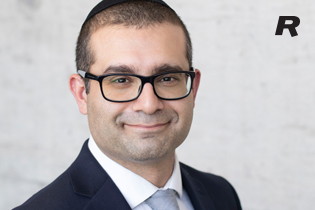
In his last year of the Morning MBA program, Farhad Mordechai Sabeti (Morning MBA ’19) was eager to get out of the classroom. Though Sabeti had learned a great deal by attending lectures, engaging in class discussions and completing assignments, he was looking forward to applying his knowledge outside the School and working on causes he truly cared about.
The Onboard Fellowship program at Rotman, which matches upper-year Full-Time, Morning/Evening and JD MBA students with non-profit organizations and charities, was exactly what he was looking for. For eight months, these students, also known as Onboard fellows, apply their business knowledge towards a strategic governance project with their partner organizations.
Past and current students have been worked with notable organizations like the SickKids Foundation, the Fort York Food Bank and the Canadian Council for Aboriginal Business. At the same time, the fellows get a glimpse of governance in action, by attending board meetings and observing how directors discuss risk and potential issues facing their organizations.
During the fellowship, which they receive course credits for, students are guided by an Onboard advisor, an experienced board member who is affiliated with the Rotman School, and a mentor, who sits on the board for the organization they are matched with. Students also attend seminar-style classes, led by past and current board members, which cover a range of governance topics, such as how to manage potential conflicts of interests and address organizational risks.
“Effective governance is about making thoughtful decisions, aspiring to do better, and staying true to your mission.”
— Farhad Mordechai Sabeti, Morning MBA ’19
Acquiring management essentials
The opportunity with Onboard aligned perfectly with Sabeti’s main motivation for pursuing an MBA. Sabeti, who is an executive director for an independent school in Toronto, knew that the skills acquired through a business school education would be particularly useful in his work.
“So much about running a school involves managing people, leadership, and thinking strategically,” Sabeti explains. “I wanted to acquire a versatile skillset, so that as the education sector continues to evolve, the school I serve could also adapt.”
While he gained a knowledge base by taking many MBA electives on leadership and planning — including Power and Influence in Organizations (taught by Professor Tiziana Casciaro) and Catastrophic Failure in Organizations (taught by Professor András Tilcsik) — he was craving an opportunity to make a difference in the community.
He jumped at the opportunity to apply to the Onboard program in his final year of business school. After submitting an application and sitting for an interview with Onboard coordinators, he was paired with First Book Canada, a non-profit that focuses on improving children’s access to education by providing books and other educational resources to schools and groups that serve low-income communities.
It was a perfect match. Sabeti, who set out to work with an organization he was passionate about, believed in First Book’s values in empowering children through education. At the same time, he had experience working in education and could appreciate the complex risks and challenges associated with operating in the non-profit space.
Creating something of value
From the outset, Sabeti was determined to produce work that the First Book team could use.
“Given the important purpose First Book serves, it was imperative that I produce something of value,” says Sabeti. “My board mentor and I didn’t want our Onboard project to end up sitting on a shelf.”
For his project, Sabeti decided to assess the current risks involved with operating in the non-profit landscape — and identify some key points that First Book should be aware of.
With help from his Onboard advisor, Ann Armstrong, and his First Book board mentor, Heather Partridge, he defined the scope of his project. Over several weeks, Sabeti interviewed the organization’s founder, board members, senior leadership and employees. After analyzing the collected data and completing additional market research, he worked hard at communicating found insights in an interpretable way.
He presented his final report at the end of the Onboard program, during his final First Book board meeting.
“Mordy was a keen learner, and he pushed us to think outside the box at his board presentation,” recalls Partridge.
“We were so impressed by how he jumped in with both feet to execute on the project. Mordy’s thoughtful and detailed approach in getting to know our board, our organization, and our culture provided that special extra touch,” she adds
Sabeti has learned so much in the process, as well.
“One of the most inspiring lessons I learned from the entire experience — from working with the entire First Book team, my mentor and attending the classes — was how having everything figured out isn’t the end goal,” says Sabeti. “Effective governance is about making thoughtful decisions, aspiring to do better, and staying true to your mission.”
Written by Rebecca Cheung